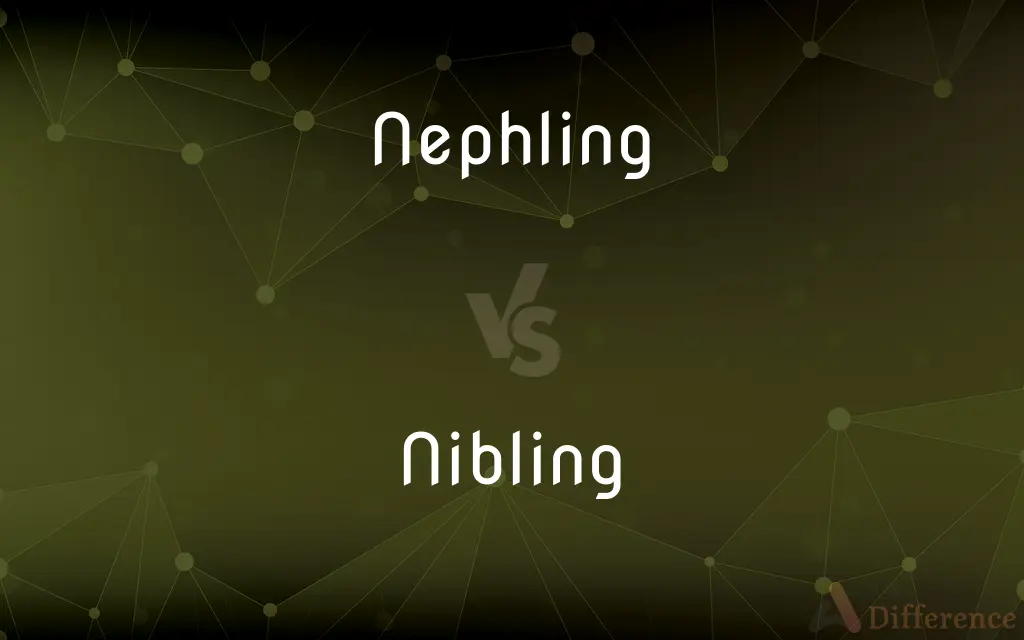Nephling vs. Nibling — What's the Difference?
By Tayyaba Rehman & Fiza Rafique — Updated on March 20, 2024
Nephling is a less common term for a sibling's child, while nibling is a gender-neutral term for nieces and nephews.

Difference Between Nephling and Nibling
Table of Contents
ADVERTISEMENT
Key Differences
Nephling, though less commonly used, refers to the children of one's siblings, akin to nieces and nephews, but without specifying gender. Whereas nibling is a more widely recognized gender-neutral term specifically coined to refer to nieces and nephews collectively, avoiding gender specification.
The term nephling is not widely recognized in formal or informal discourse and may confuse some due to its rarity. On the other hand, nibling has gained acceptance in both social and academic contexts as a convenient and inclusive term for referring to a sibling's children.
Nibling is particularly useful in contexts where gender is irrelevant or when aiming for inclusivity. It simplifies language by avoiding the cumbersome "nieces and nephews." In contrast, nephling, though serving a similar purpose, has not seen the same level of adoption or recognition.
The introduction of nibling into the English language reflects evolving attitudes towards gender neutrality and inclusivity. Nephling, while it may serve a similar purpose, does not have the same backing or popular usage, indicating how language adapts to cultural shifts.
Despite their similarities, the choice between nibling and nephling can also signal the speaker's engagement with contemporary linguistic trends. Nibling, being more common, might be preferred for clarity and inclusivity, whereas nephling might be seen as an unusual or novel choice.
ADVERTISEMENT
Comparison Chart
Definition
A less common term for a sibling's child, not specifying gender.
A gender-neutral term for nieces and nephews.
Popularity
Less commonly used and recognized.
Widely recognized and used for its inclusivity.
Context of use
Rare and may cause confusion.
Used in both social and academic contexts for clarity and inclusivity.
Contribution to language
Does not significantly impact linguistic trends.
Reflects and promotes gender neutrality and inclusivity in language.
Perception
May be seen as novel or unusual.
Considered a contemporary and practical term.
Compare with Definitions
Nephling
Little impact on promoting inclusivity.
Nephling hasn't caught on widely as an inclusive term.
Nibling
Fosters inclusivity and clarity.
Using nibling avoids the need to specify gender.
Nephling
A less common term for a sibling's child, without specifying gender.
I'm taking my nephling to the park today.
Nibling
A gender-neutral term for nieces and nephews.
I bought gifts for my niblings.
Nephling
Not widely used or recognized.
When I used nephling in conversation, my friend was confused.
Nibling
Widely accepted and used.
The term nibling is becoming more popular in inclusive language discussions.
Nephling
May cause confusion due to its rarity.
The term nephling isn't found in most dictionaries.
Nibling
Reflects gender-neutral language trends.
Nibling is part of a broader movement towards inclusive language.
Nephling
Seen as novel by some.
Some people find the term nephling to be a curious alternative to nibling.
Nibling
Considered contemporary and practical.
Many people appreciate nibling for its modern, inclusive approach.
Nephling
(rare) A nibling.
Nibling
Used especially as a gender-neutral term: the child of one's sibling or sibling-in-law; one's nephew or niece.
Common Curiosities
How is nephling different from nibling?
Nephling is a less common and less recognized term than nibling, though both serve to refer to a sibling's children without specifying gender.
What are the benefits of using nibling over traditional terms?
The main benefits include linguistic simplicity and the promotion of inclusivity by not specifying gender.
Is nephling widely accepted?
Nephling is not widely accepted or used, and it may be unfamiliar to many.
How do I introduce the concept of niblings to someone unfamiliar with the term?
You can explain that nibling is a gender-neutral term for nieces and nephews, emphasizing its inclusivity and simplicity.
What is a nibling?
A nibling is a gender-neutral term used to refer to nieces and nephews collectively.
Why use the term nibling?
Nibling is used for its inclusivity and convenience, avoiding gender specification and simplifying language.
Is the use of nibling becoming more common?
Yes, the use of nibling is becoming more common as awareness and appreciation for gender-neutral language grow.
Can I use nibling in formal writing?
While its acceptance can vary, nibling is increasingly recognized in various contexts, including some formal ones.
Why has nibling gained popularity over nephling?
Nibling has gained popularity due to its clear purpose, ease of use, and contribution to inclusive language.
Can the terms nibling and nephling be used interchangeably?
While they can be used interchangeably in meaning, nibling is generally preferred for its wider recognition and clarity.
Do nephling and nibling mean exactly the same thing?
Essentially, yes, both terms refer to a sibling's children in a gender-neutral way, but nibling is the more commonly used term.
What is the origin of the term nibling?
Nibling originated as a convenient, gender-neutral way to collectively refer to nieces and nephews, reflecting evolving language towards inclusivity.
How might the term nephling be perceived in a conversation?
Nephling might be perceived as unusual or novel, and it may require explanation due to its lesser-known status.
Are there specific contexts where nibling is preferred over nephling?
Yes, nibling is preferred in contexts that value inclusivity and clarity, due to its broader recognition and acceptance.
How can using nibling contribute to more inclusive language?
Using nibling helps avoid unnecessary gender distinctions, promoting a more inclusive approach to language.
Share Your Discovery

Previous Comparison
Brig vs. Ship
Next Comparison
Ekabor vs. EkaboronAuthor Spotlight
Written by
Tayyaba RehmanTayyaba Rehman is a distinguished writer, currently serving as a primary contributor to askdifference.com. As a researcher in semantics and etymology, Tayyaba's passion for the complexity of languages and their distinctions has found a perfect home on the platform. Tayyaba delves into the intricacies of language, distinguishing between commonly confused words and phrases, thereby providing clarity for readers worldwide.
Co-written by
Fiza RafiqueFiza Rafique is a skilled content writer at AskDifference.com, where she meticulously refines and enhances written pieces. Drawing from her vast editorial expertise, Fiza ensures clarity, accuracy, and precision in every article. Passionate about language, she continually seeks to elevate the quality of content for readers worldwide.















































